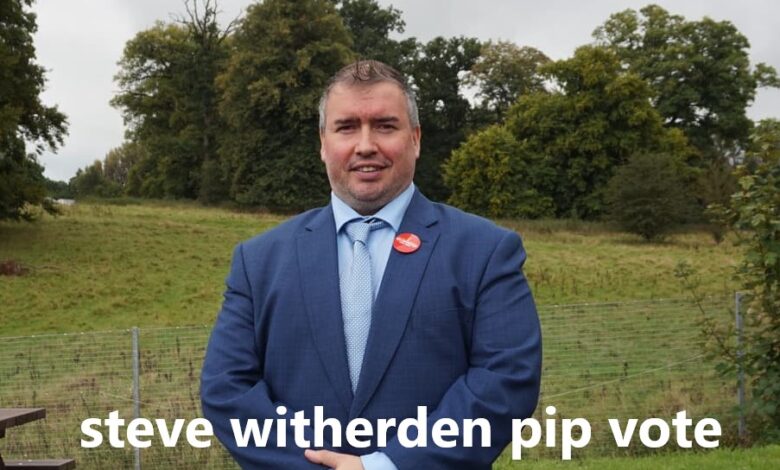Steve Witherden PIP Vote: A Bold Stand for Disability Rights in Parliament

The Steve Witherden PIP vote has sparked national conversation about disability rights and social justice in the UK. As the Member of Parliament for Montgomeryshire and Glyndŵr, Witherden made headlines when he defied the Labour Party line and voted against the Universal Credit and PIP Bill. His decision was not just a matter of political rebellion—it was a powerful statement in defense of the country’s most vulnerable citizens. In this article, we explore why Steve Witherden chose to take this stand, the implications of the vote, and what it reveals about the current state of UK politics.
Steve Witherden: Who Is He?
Early Life and Education
Born in Wrexham, Steve Witherden grew up in a working-class family. His early life was shaped by educational struggles; diagnosed with dyslexia and dyscalculia, he didn’t learn to read until the age of eleven. These challenges did not deter him—instead, they fueled his passion for education and equality. Witherden later studied English Literature at the University of Wales, Lampeter, and earned his teaching qualification from Aberystwyth University.
Career Before Politics
Before entering politics, Witherden worked for nearly two decades as a secondary school teacher and head of drama. He was also an active trade union representative, advocating for teachers’ rights and improved school conditions. His grassroots background and commitment to fairness made him a trusted figure in his community long before he stepped into Parliament.
The Universal Credit and PIP Bill: What’s at Stake?
What Is PIP?
Personal Independence Payment (PIP) is a welfare benefit in the UK that supports people living with long-term disabilities or health conditions. The benefit is vital for many individuals, helping them cover essential costs associated with daily life.
The Government’s Proposed Changes
The new Universal Credit and PIP Bill proposed by the UK government aimed to reform the way PIP is assessed and delivered. One of the most controversial elements was a change in the scoring system that determines eligibility. Critics feared that the changes could lead to thousands of people being unfairly denied support.
Last-Minute Concessions
Just 90 minutes before the second reading vote in Parliament, the government announced a delay in implementing the scoring changes. Instead, they promised a full review. However, this was a verbal promise—not a legally binding amendment—leaving many skeptical about its reliability.
Steve Witherden’s Vote: A Bold Act of Conscience
Breaking Party Lines
While the Labour Party leadership instructed MPs to abstain from voting, Witherden took a different path. Alongside 48 other Labour MPs, he voted against the bill. His reasoning was clear: he could not, in good conscience, support a proposal that had the potential to impoverish disabled constituents.
Statement of Principles
Witherden stated that the last-minute government concessions were insufficient and lacked clarity. He emphasized that promises made outside of formal legislation cannot be trusted when people’s livelihoods are on the line. His decision was rooted in principle, not political strategy.
The Only Welsh Labour MP to Rebel
Notably, Witherden was the only Welsh Labour MP to vote against the bill. This action distinguished him as a lone voice of dissent from Wales, further underlining his courage and commitment to justice.
Reaction and Aftermath
Public Response
Many constituents and disability rights groups praised Witherden for standing up for what he believed in. Social media saw an outpouring of support, hailing him as a “people’s MP” who prioritized morality over political convenience.
Political Implications
His vote also highlighted internal tensions within the Labour Party. While party unity is often emphasized, Witherden’s defiance demonstrated the complexity of aligning collective goals with individual integrity. The Labour leadership, under pressure from its left wing, now faces growing scrutiny over its stance on welfare reform.
Future of the Bill
Despite opposition, the bill passed its second reading by a majority of 75 votes. It now moves to the committee stage, where further amendments and debates are expected. Witherden has stated he might support the bill at the third reading, but only if the promised consultation becomes a formal part of the legislation.
A Look Into Steve Witherden’s Political Philosophy
Champion for the Underdog
Witherden’s politics are shaped by his own life experiences. As someone who overcame educational challenges and worked on the front lines of public service, he understands the importance of government support systems. His politics emphasize fairness, compassion, and evidence-based policymaking.
Member of the Socialist Campaign Group
As a member of the Socialist Campaign Group, Witherden aligns with progressive values within the Labour Party. This group champions policies that prioritize the working class, public ownership, and robust social safety nets. His PIP vote is a reflection of these broader ideals.
What This Means for Disabled People in the UK
Fear and Uncertainty
The proposed changes to PIP have introduced anxiety among disabled communities. While a consultation has been promised, the uncertainty surrounding its outcome leaves many in limbo.
Need for Representation
Witherden’s vote reminds us of the importance of having MPs who are willing to speak out—even against their own party—when public welfare is at stake. His actions offer a glimmer of hope for those who feel voiceless in the political process.
Conclusion
The Steve Witherden PIP vote marks a defining moment in recent UK parliamentary history. It was not just a vote against a bill—it was a vote for fairness, transparency, and accountability. In standing alone among Welsh Labour MPs, Witherden reminded the nation that true leadership is measured not by obedience, but by courage. His bold stance offers a powerful example of what it means to represent with integrity and to legislate with empathy.



